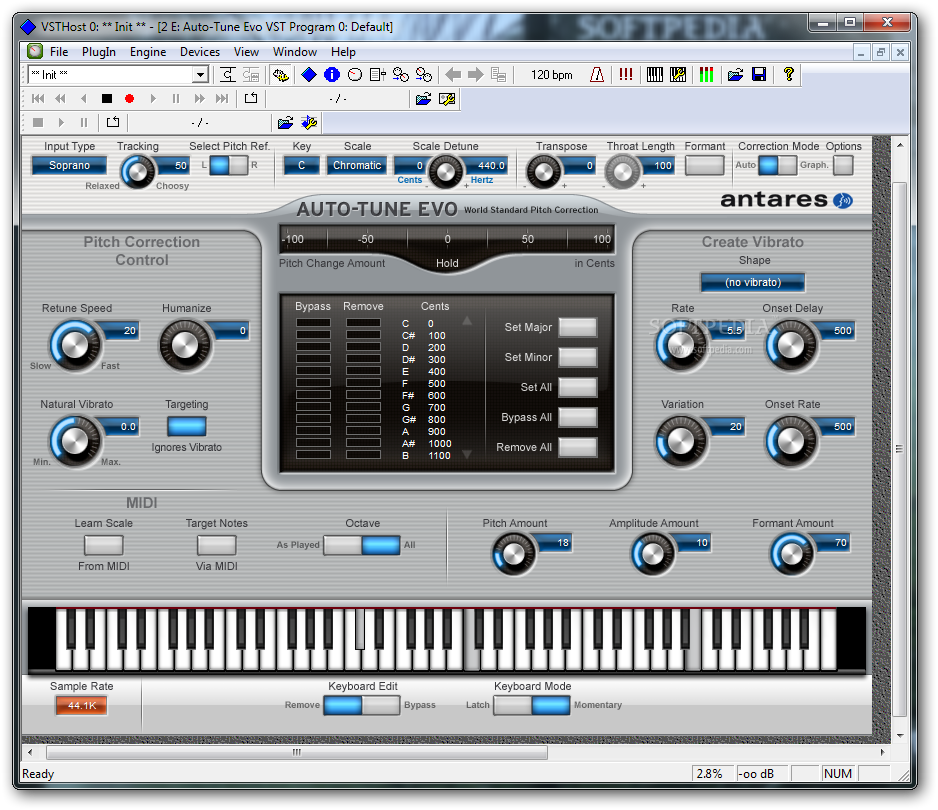GSnap is a free autotune VST plugin from GVST, which can be used to. On a computer that has Audacity installed, go to gvst.co.uk/gsnap.htm and click on. You can’t run the authorisation with Audacity because Audacity does not support it. In order to run Autotune plug-in, you need to run iLok with a host that supports it, so that you can then authorise the Autotune plug-in to run. This has nothing to do with Audacity. Please refer to the Autotune and iLok. Unduh GSnap, yang merupakan efek untuk auto-tune. GSnap adalah efek gratisan yang bisa Anda tambahkan ke Audacity dan berfungsi mengatur auto-tune.Seperti Audacity dan VST, GSNap tersedia secara gratis di situs ini. Meskipun komputer dengan sistem operasi Mac dan Linux dapat menggunakan Audacity. Audacity has built-in support for Nyquist effects on all operating systems. You can download additional Nyquist plug-ins, or create your own using the Nyquist programming language. Nyquist code can be conveniently tested using “ Nyquist Prompt ” under the Effect menu.

- You can enable autotune in Audacity by installing the GSnap plug-in.
- GSnap is a free Audacity plug-in that can help you autotune your audio files.
- GSnap can be used with Audacity on Windows, macOS, and Linux devices.
- To install GSnap, you'll just need to copy its file into Audacity's 'Plug-Ins' folder, and then enable it in Audacity.


If you've ever needed to correct a song's pitch or tuning in Audacity, you might be surprised to realize there isn't an autotune feature bundled with Audacity's many default audio effects.
However, you can still use autotune (not to be confused with the Auto-Tune brand) in Audacity by downloading a free plug-in called GSnap. GSnap allows you to autotune and adjust the pitch of your recorded files on Windows, Mac, and Linux computers.
Here's how to get GSnap, and add it to Audacity.
How to autotune in Audacity by adding the GSnap plug-in
GSnap is the most popular free autotune plug-in for Audacity, and installing it is largely the same regardless of whether you're using Windows, MacOS, or Linux.
Of course, you need to make sure you have installed Audacity on your computer before you can use GSnap.
Autotune En Audacity
1. On a computer that has Audacity installed, go to gvst.co.uk/gsnap.htm and click on the link that corresponds to the operating system of the computer you're using. For example, if your computer runs on Windows, click on the link beneath 'Windows.' If there are multiple links listed underneath your respective operating system, try the 32-bit VST version first and see if it works before trying the 64-bit VST version.
© Chrissy Montelli/Business Insider2. Select a location on your computer to save the GSnap plug-in and click 'Save' when you're finished. Remember where you save it - you'll need to come back to it later.
3. GSnap will begin downloading in your internet browser as a zipped file. Once it finishes downloading, open the zipped file. There will be two files inside of it - one called 'GSnap,' and another called 'GVSTLicense.'
4. Copy the file called 'GSnap.' You can do this either by right-clicking on it and selecting 'Copy,' or with a keyboard shortcut (Ctrl + C on PC).
© Chrissy Montelli/Business Insider5. Using a new file browser window, you'll need to open Audacity's plug-ins folder. To find it, navigate to where you saved Audacity to on your computer when you downloaded it. For example:
- You can find it by default in Windows at either C:Program Files (x86)AudacityPlug-Ins or C:Program FilesAudacityPlug-Ins.
- In macOS, go to your Applications folder and right-click Audacity's icon, then select 'Show Package Contents.' Then open the folders 'Contents,' and 'plug-ins.'
6. Paste the GSnap file you copied into this Plug-Ins folder. You can do this by right-clicking and selecting 'Paste,' or by using the keyboard shortcut (Ctrl + V on PC).
© Chrissy Montelli/Business Insider7. If you receive a message asking for administrator permission, click 'Continue' and wait for any pending downloads to complete.

8. Open Audacity. If you already had it open, you need to restart it in order for GSnap to be recognized.
9. In Audacity, open an existing audio file or record a new one.
10. Under Audacity's 'Effect' tab, click on 'Add/Remove Plug-ins…' © Chrissy Montelli/Business Insider
11. Find GSnap in the file list and click on it. Then, click 'Enable.'
Autotune Audacity Linux
© Chrissy Montelli/Business Insider12. From now on, when you view the 'Effect' tab on Audacity, GSnap will be listed as one of the available effects. When clicked, it will open a window that lets you autotune your audio file.
Autotune In Audacity
© Chrissy Montelli/Business Insider
The GSnap window itself has over a dozen knobs and options, each of which can be used to autotune the selected audio. Experiment with the options, or check out GSnap's online manual for more information.
© Chrissy Montelli/Business InsiderRelated coverage from Tech Reference:
